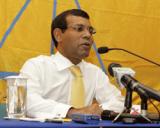 Male, Mar 5: Former Maldivian president Mohammed Nasheed was arrested Tuesday, causing a fresh uproar and protests in this capital city.
Male, Mar 5: Former Maldivian president Mohammed Nasheed was arrested Tuesday, causing a fresh uproar and protests in this capital city.Nasheed was arrested just outside his house by around 20 police personnel, who took him
away without an explanation, Xinhua news agency reported citing Nasheed's Maldivian Democratic Party (MDP) spokesperson Hameed Abdul Gafoor.
"They just took him. We do not know why and we do not know where he has been taken," Gafoor said.
Meanwhile, Maldivian government officials said that Nasheed was arrested after a court issued a third arrest warrant against him Tuesday.
Nasheed is charged with ordering the military to unconstitutionally detain the Chief Judge of the Criminal Court Judge Abdulla Mohamed, while he was head of state.
Last month, Nasheed had evaded previous two arrest warrants by seeking diplomatic shelter in the Indian High Commission in Male. He took shelter in the Indian Mission for 11 days after failing to appear in court.
MDP believes Nasheed has been arrested over fresh summons issued by a court, said MDP Party member Shauna Aminath.
"The party is shocked as we do not know the real reason behind his arrest. We do not even know where he is taken. The government has properly planned this just before the elections," Aminath said.
MDP, however, said this is a politically motivated case designed to ensure he does not contest the Sep 7 presidential polls.





Comments
Add new comment